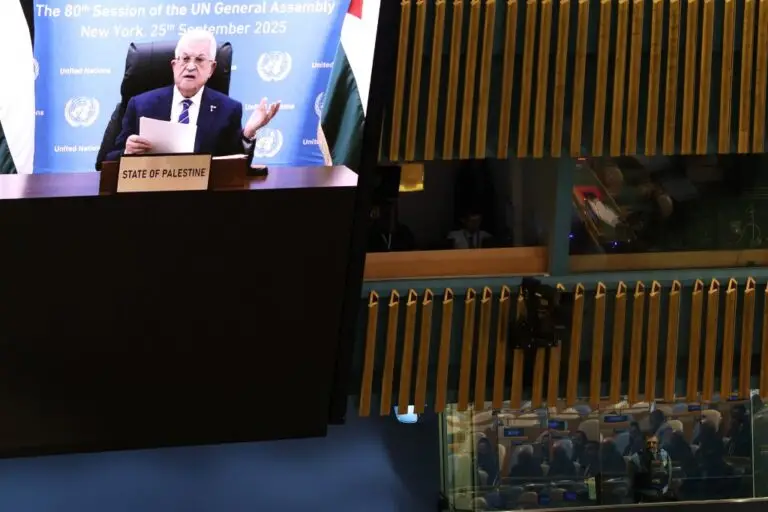Mahmoud Abbas, at 89 years old, now finds himself at the center of a storm that is as much about global power as it is about Palestine. This week, barred from entering the United States for the United Nations General Assembly, Abbas addressed the world by video — an image that captured both his persistence and his precarious position.
An Unwelcome Guest on American Soil
Washington’s refusal to grant Abbas a visa was no small slight. For decades, Palestinian leaders have used the UN stage in New York to demand recognition. Denied that platform, Abbas’ remote appearance underscored his diplomatic isolation even as several European powers formally recognized a Palestinian state. The symbolism was stark: Europe opens doors, the U.S. closes them.
Recasting the Narrative
Abbas’ speech went beyond predictable calls for recognition. He drew a sharp line against Hamas, declaring they would have no role in governance and insisting that weapons be surrendered to the Palestinian Authority. For a leader long accused of tolerating ambiguity, this was an unambiguous break — an attempt to reassure skeptical allies that the Palestinian Authority alone could steer a future state.
He also condemned antisemitism outright, seeking to undercut one of Israel’s most potent rhetorical weapons. By rejecting both the October 2023 Hamas attacks and any attempt to conflate Palestinian solidarity with hatred of Jews, Abbas sought to position his movement as morally distinct from its rivals.
A Clash of Global Agendas
But his words landed in a fractured international arena. In Jerusalem, Prime Minister Benjamin Netanyahu dismissed the recognitions of Palestinian statehood as irrelevant, vowing that “there will be no Palestinian state.” In Paris, President Emmanuel Macron framed Abbas’ vision as aligned with European efforts to prevent annexation.
Meanwhile, Donald Trump resurfaced on the margins of the General Assembly with his own proposed “21-point plan” for ending the war — a plan his confidants say blends Israeli security guarantees with international peacekeeping proposals. Indonesia quickly signaled willingness to send troops, underscoring how far the conflict has drawn in global actors.
The Weight of History
Abbas cast the devastation in Gaza as one of the “most horrific chapters of modern humanitarian tragedy,” implicitly ranking it alongside the darkest events of the last century. His words aimed to etch Palestinian suffering into the world’s collective conscience.
Yet the reality is that his authority remains fractured. Hamas still rules Gaza. Netanyahu remains defiant. And Washington’s cold shoulder signals that, despite Europe’s recognition, Palestinian statehood is still hostage to geopolitical leverage.
What Comes Next
Abbas has, perhaps for the first time in years, set a clear boundary: Palestine without Hamas. Whether that boldness translates into momentum or further marginalization will depend not on applause in UN halls but on whether world powers — particularly the United States — are prepared to act.
The stage is set for Netanyahu’s upcoming speech in New York. If Abbas’ remote address was a plea for legitimacy, Netanyahu’s will be a demonstration of strength. Between those two performances lies the unresolved question: is Palestine closer to recognition, or further than ever?






